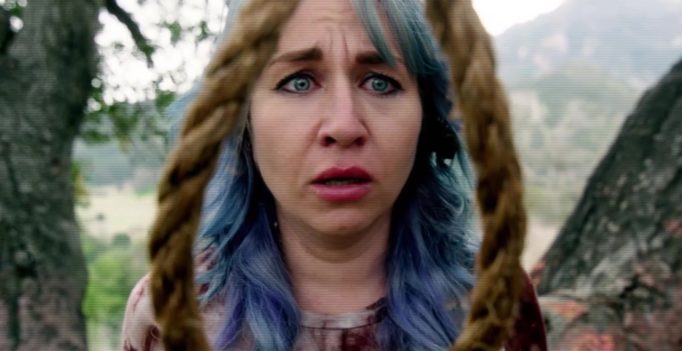What is the point of making a found footage film when it is surrounded by a traditional narrative style? Not like Cannibal Holocaust, where the traditional style was used as a framing device to present the found footage, but rather a traditional narrative that occasionally cuts to a shot from the point-of-view of a camera with a red record signal in the corner. With Marcel Walz’s Rootwood, there isn’t even a documentary concept surrounding the whole thing, as the traditional elements are more concerned with stating that a documentary is being made than utilizing actual documentary aesthetics. In fact, the few documentary aesthetics are so obvious -“are we making a movie?” style dialogue – that their presence is both frustrating and confusing, as they are spoken in a narrative space.
Wait, let’s step back a second and give some context. Rootwood follows a couple of filmmakers who are commissioned to make a documentary about a local legend, the Wooden Devil. Before anything even begins, Walz’s film will baffle the viewer. And that might be for the best, because not much even happens until halfway through. Before the first “scare” appears, the story is more concerned with sexual tension among a group of good-looking people who do not even have enough acting talent to convey the tension.
Thankfully, with the arrival of the first scare, the audience is finally let in on a discouraging secret: there may be nothing worthwhile in Rootwood. The monster effects are decent to good, but they are so frequently misplaced, they never work – one potentially fantastic scene is telegraphed through a variety of clichés and then when it appears, it ends almost immediately. The characters practically refuse to evolve as well. The dialogue manages to devolve throughout with further reliance on “we’re making a movie” language and badly contrived “spooky” writing. And the ending? The less said about it, the better.
Rootwood is a great disappointment, but mostly because the initial idea is an interesting one. Sure, it’s basically the plot of The Blair Witch Project, but there are so many better directions this narrative could be taken in more competent hands. As it stands, this film is not worth your time or money. At best, it may convince you that quarantine is not all that bad if this version of the outdoors is the alternative.
**********
Do You Tweet? Follow These Tweeple:
Shahbaz Khayambashi: @Shakhayam




Leave a comment